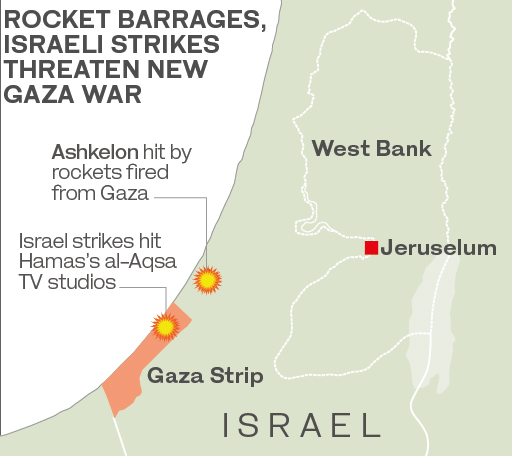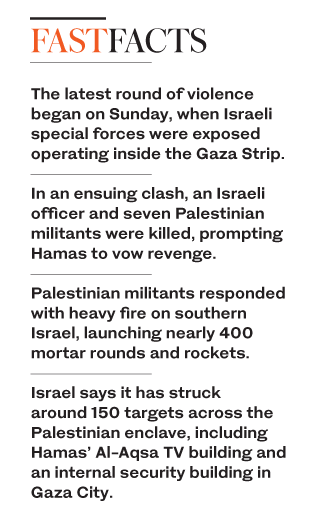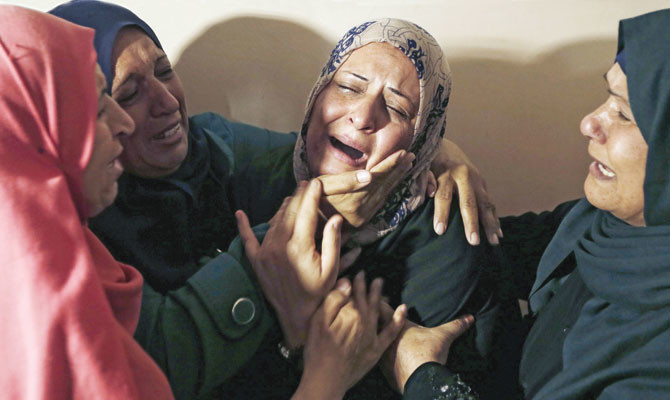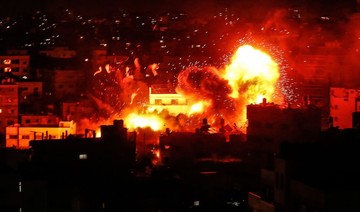GAZA: Hamas and other Gaza militant groups said Tuesday they have accepted an Egyptian-brokered cease-fire after launching hundreds of rockets into Israel over the past 24 hours and weathering a wave of Israeli airstrikes.
There was no immediate word from Israel on whether it had accepted a deal to halt the heaviest exchange of fire with Gaza’s Hamas rulers since a 2014 war.
Just an hour before the militants made their declaration, the Israeli Security Cabinet said it had ordered the military to “continue operations as needed,” following a six-hour meeting.
The cease-fire was announced by a group of Gaza militant groups, including Hamas, whose leader Ismail Haniyeh earlier signaled a readiness to halt the latest round of fighting. He said the Islamic militant group would stop its rocket fire if Israel halts its airstrikes.
The worst escalation between Israel and Palestinian militants in Gaza since a 2014 war threatened to descend into full-blown conflict on Tuesday after further barrages of rocket fire and dozens more airstrikes overnight.
Six Palestinians were killed in Gaza in less than 24 hours as Israeli strikes targeted militants and flattened buildings while sending fireballs and plumes of smoke into the sky.

Sirens wailed in southern Israel and tens of thousands of residents took cover in shelters as around 400 rockets and mortar rounds were fired from the Gaza Strip, wounding 27 people, including three severely.
A Palestinian laborer from the occupied West Bank was killed when a rocket hit a building in the Israeli city of Ashkelon.
Schools were closed in the Gaza Strip and in southern Israel as both sides warned the other that it would respond forcefully to any further violence.
A spokesman for Hamas’ armed wing, Abu Obeida, threatened to further expand its targets “if the enemy continues to bomb civilian buildings.”
Israeli military spokesman Jonathan Conricus said: “What we have signaled to Hamas over this night is that we have the intelligence and capabilities to strike a very wide range of military targets that belong to Hamas.”
Egypt, which has negotiated cease-fires following previous flare-ups, was said to be seeking to restore calm.
UN Middle East envoy Nickolay Mladenov, who along with Egypt had been seeking a long-term truce between Israel and Hamas, called the escalation “extremely dangerous” and said on Twitter that “restraint must be shown by all.”
The latest round of violence began on Sunday with a botched Israeli special forces operation inside the Gaza Strip that turned deadly and prompted Hamas to vow revenge.
The clash that resulted from the blown covert operation killed seven Palestinian militants, including a local Hamas military commander, as well as an Israeli army officer.
Palestinian militants responded with rocket and mortar fire, as well as an anti-tank missile that hit a bus that Hamas says was being used by Israeli soldiers. A soldier was severely wounded in the attack.
Missile defenses intercepted more than 100 rockets from Gaza and most others fell in open areas, though some hit houses and other civilian structures.
“Within two seconds (after air sirens) we heard a huge boom, we saw our curtains flying in the air, windows (broken), and only after a few minutes when we went out, we realized that the missile had hit the building next to us,” said Claude Bonfito, who lives near a block of flats hit by a rocket in the Israeli city of Ashkelon.
Israel hit back with major airstrikes, with targets including Hamas’ Al-Aqsa TV station and internal security headquarters in Gaza City.
The military says it has so far struck some 150 targets in the Gaza Strip.
“What happened was like an earthquake,” said Abu Ayman Lemzeni, who lives near the destroyed TV building.
“As you see, here there is no more the grocery, the pharmacy, the office, the wall, the building.”
Five of the dead in Gaza were claimed as members of various militant groups. Some 25 other people were wounded in the Palestinian territory, according to Gaza’s Health Ministry.
After Sunday’s clash, Israeli Prime Minister Benjamin Netanyahu cut short a visit to Paris and flew home.
He convened a meeting of his security Cabinet on Tuesday.
The escalation has come despite Netanyahu’s decision to allow Qatar to transfer millions of dollars in aid to the Gaza Strip for salaries as well as fuel to ease an electricity shortage.
The agreements had led to calmer protests along the Gaza border after months of deadly unrest.
Sunday’s special forces operation and resulting clash upset those efforts, leading to questions over the timing of the covert Israeli move.
Israel said it was an intelligence-gathering operation and that those efforts must continue to defend the country.
Israel and Palestinian militants in Gaza have fought three wars since 2008, and protests and clashes along the Gaza border since March 30 have repeatedly raised fears of a fourth.
At least 233 Palestinians in Gaza have since been killed by Israeli fire, the majority during protests and clashes.
Two Israeli soldiers have been killed over the same period.




















